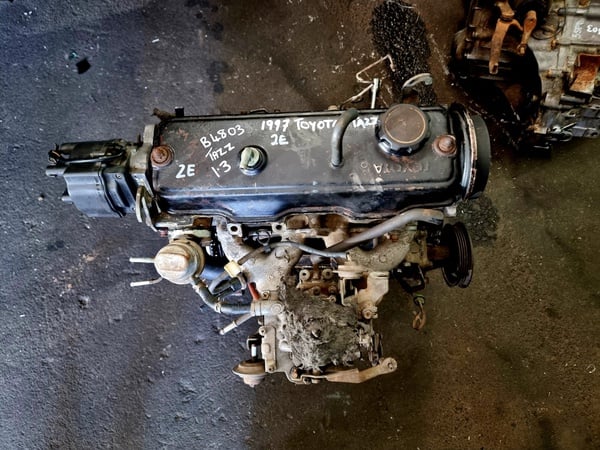Unlock Performance: Toyota Tazz Engine for Sale at Affordable Prices
Unlock Performance: Toyota Tazz Engine for Sale at Affordable Prices
Blog Article
Engine Purchasing Specialist Tips on Picking the Right Engine for Your Specific Needs
Selecting the right engine for your details demands includes a complex interaction of aspects that go beyond mere horse power figures. By delving right into the details of power versus performance, assessing gas ratings, and budgeting for long-lasting costs, one can truly maximize their engine selection.
Power Vs. Efficiency: Discovering the Balance

When selecting an engine, it is crucial to strike an equilibrium in between power and effectiveness to meet your specific needs properly. Power refers to the engine's ability to generate energy for propulsion, establishing elements like acceleration, towing capability, and overall efficiency (Toyota Tazz Engine For Sale). On the other hand, efficiency associates with just how well the engine utilizes gas to produce power, impacting variables such as fuel economy and environmental kindness
Attaining the best equilibrium between power and efficiency is essential since an engine that is too effective may take in excessive gas, resulting in greater operating expense and unneeded strain on the setting. On the other hand, an engine that prioritizes effectiveness over power may lead to slow-moving performance, specifically popular scenarios like towing hefty lots or driving uphill.
To make a notified choice, consider aspects such as your normal driving conditions, the designated use the vehicle, and your individual choices. By evaluating your needs and concerns, you can pick an engine that strikes the perfect equilibrium between power and effectiveness, ensuring optimal performance while decreasing environmental effect and operating expense.
Understanding Engine Size and Kind

Typical engine types include inline engines, V engines, and rotary engines, each with its special benefits and disadvantages. Comprehending the interplay between engine dimension and kind is essential in picking an engine that lines up with your particular needs and priorities, whether it be power, effectiveness, or a balance of both.
Consider Your Automobile's Requirements
Considering your vehicle's needs is a basic action in the engine choice procedure to make sure optimal efficiency and capability. It is important to review aspects such as the meant usage of the car, its weight, lugging capability, and gas performance requirements. As an example, click for source if you are seeking an engine for a heavy-duty vehicle that will certainly be utilized for towing, you will certainly need a powerful engine with high torque capabilities. On the various other hand, if you are selecting an engine for a small vehicle mostly used for city travelling, gas effectiveness may be a more critical variable to think about.

Reviewing Fuel Performance Ratings
Examining fuel effectiveness scores is a critical aspect of choosing the right engine for your car, making sure cost savings and ecological sustainability. Fuel effectiveness ratings, generally measured in miles per gallon (MPG) for gasoline engines or kilowatt-hours per 100 miles (kWh/100 miles) for electrical engines, show just how far a lorry can take a trip on a particular amount of gas or power. Higher MPG or lower kWh/100 miles values indicate extra reliable have a peek at this website engines, converting to decreased fuel prices and reduced carbon discharges.
Additionally, compare various engine choices within the same automobile course to determine the most affordable choice. Aspects such as engine dimension, weight, the rules of aerodynamics, and hybrid or electric capacities can all influence fuel effectiveness.
Budgeting for Long-Term Costs
Strategically intending for long-term expenses is important when choosing an engine, guaranteeing economic sustainability over the lorry's life-span. While the first acquisition cost of an engine is a considerable element, it is essential to think about the lasting prices connected with maintenance, repairs, and gas intake.
Furthermore, researching the accessibility and price of replacement parts for the picked engine is important in spending plan planning. By very carefully budgeting for these long-term costs and factoring them right into the decision-making process, people can select an engine that not just fulfills their immediate requirements yet likewise stays cost-efficient throughout its lifespan.
Final Thought
In verdict, selecting the ideal engine for your details needs needs balancing power and performance, recognizing engine size my latest blog post and type, considering your automobile's needs, assessing fuel efficiency rankings, and budgeting for long-term costs. By very carefully taking into consideration these factors, you can guarantee that you select an engine that satisfies your requirements and gives optimum performance for your vehicle.
To even more fine-tune the choice procedure of an engine that strikes the optimal balance between power and effectiveness, it is important to delve into the complexities of comprehending engine size and type. Engine size refers to the total volume of air and fuel that can be pushed via the engine cyndrical tubes. Common engine types include inline engines, V engines, and rotary engines, each with its unique advantages and drawbacks. Understanding the interaction between engine size and type is essential in picking an engine that lines up with your certain requirements and top priorities, whether it be power, performance, or a balance of both.
Fuel performance scores, usually gauged in miles per gallon (MPG) for gasoline engines or kilowatt-hours per 100 miles (kWh/100 miles) for electric engines, show just how much an automobile can travel on a specific amount of fuel or electrical power.
Report this page